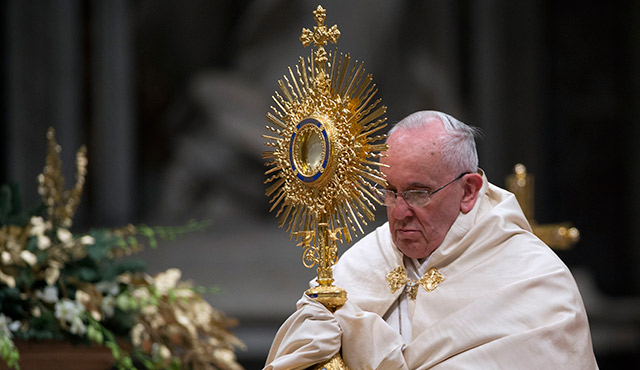“Adoration is the first attitude of man acknowledging that he is a creature before his Creator. It exalts the greatness of the Lord who made us and the almighty power of the Savior who sets us free from evil. Adoration is the homage of the spirit to the “King of Glory,” respectful silence in the presence of the ‘ever greater’ God. Adoration of the thrice-holy and sovereign God of love blends with humility and gives assurance to our supplications.”
—Catechism of the Catholic Church (No. 2628)
In his 1980 apostolic exhortation Dominicae Cenae, Pope John Paul II wrote that “the Church and the world have a great need of Eucharistic adoration.” Yearning to intensify their devotion to Jesus and grow their spiritual lives, many Catholics find that spending an occasional hour with the exposed Holy Eucharist creates true purpose and gives deeper meaning to their faith.
Scripture declares that when we gaze upon the Blessed Sacrament, we look upon Jesus, the son of God. “Indeed, this is the will of my father, that everyone who looks upon the son and believes in him shall have eternal life,” writes John in 6:40. “Him I will raise up on the last day.” Indeed, Proverbs 8:31 notes that each moment we spend with Jesus in the Blessed Sacrament gratifies him: “My joy, my pleasure, my delight is to be with you.”
Adoration of the Blessed Sacrament through periodic, 24-hour exposition in local parishes or in Holy Hour devotions is a centuries-old practice rooted in an essential teaching of Catholic Christianity: that Jesus Christ is truly and completely present in the Eucharist.
A short history of sacramental adoration
Adoration of the Blessed Sacrament developed gradually over the centuries. It was spawned by the refinement of the Church’s teaching on the real presence of Christ in the sacrament in the 11th century as processions, visits to the Blessed Sacrament and other sacramental prayers became part of Catholic life. When the Feast of Corpus Christi was created in the 13th century, Eucharistic adoration gained popularity and today Eucharistic Congresses continue to promote the devotion worldwide.
Prolonged Eucharistic adoration is one of the distinguishing characteristics of Roman Catholicism and is credited with the calling of saints and bringing of converts to the Catholic Church. Saint Faustina Kowalska says she was called to religious service while attending the exposition of the Blessed Sacrament when she was just 7 years old.
Local efforts in exposition
Upon the formation of the Diocese of Orange in 1977, Bishop William Johnson announced a diocesan program of Eucharistic exposition in local parishes and urged Catholics to use their time before the Eucharist to pray for vocations. Bishop Johnson’s announcement coincided with the newly instituted practice of receiving communion in the hands rather than on the tongue.
While no comprehensive list of dates and times where Eucharistic exposition takes place is available today, Eucharistic adoration takes place for at least one 24-hour period per month in most parishes, says Lesa Truxaw, director of the Office for Worship of the Diocese of Orange. Interested Catholics should check with their local parish on when the Eucharist will next be exposed.
An extension of the mass
The United States Conference of Catholic Bishops notes that Eucharistic exposition and benediction is an extension of the adoration of the Blessed Sacrament that occurs at every Mass. Thus, exposition of the Blessed Sacrament flows from the sacrifice of the Mass and serves to deepen our hunger for communion with Christ and the rest of the Church. Periodic exposition of the Blessed Sacrament is distinctly different from perpetual adoration, a Eucharistic devotion in which members of a parish unite to take hours of adoration before the Blessed Sacrament both during the day and night, seven days a week.
“Exposition of the Blessed Sacrament is different from adoration,” Truxaw noted. “Adoration is simply prayer before the Blessed Sacrament, which is present in the tabernacle. Exposition typically happens over a 24-hour period in a parish when Christ is present to us in the monstrance.”
Saint Thomas Aquinas noted that exposition of the Eucharist does not make Christ more present to us, Truxaw explains, but makes us more present to Christ.
“There is a deepening of our spiritual life and our spiritual union with Christ that comes through worshipping with the exposed Blessed Sacrament,” Truxaw says. “It is never for merely our own purpose, but through this worship we become Christ to the world. That’s one of the spiritual benefits.”

